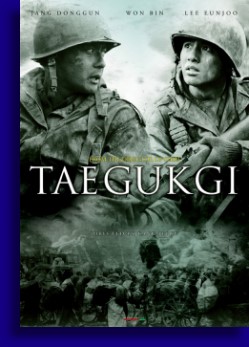

Reviewed by
Christopher Armstead



On the advice of my good friend Pete I purchased this movie ‘Tae Guk Gi: Brotherhood of War’ probably a couple of years ago because he spoke so highly of it. The thing is I never got around to watching it, partly because my man Pete recommended it. This is the same cat that also recommended that I see ‘Man Bites Dog’ and ‘Cannibal Holocaust’ so while we respect his opinion we don’t jump into Pete’s recommendations head first since watching a Pete recommended movie usually means you’ll be curled up in your bed hating life for the next week or so. But after finally sucking it up and watching a movie often termed as the Korean version of ‘Saving Private Ryan’ it’s not nearly as brutal as I suspected. Oh, it is plenty violent, no doubt about that, but it’s also pretty darned melodramatic too which does take the edge of the brutal carnage a little bit.
Our film opens in present day South Korea with an archeological team on a dig unearthing artifacts and skeletal remains from the Korean War when they stumble upon the remains of one Lee Jin-seok. But Lee Jin-seok is still very much alive, though the septuagenarian doesn’t get around as good as he used to. When these archeologist contact Jin-seok he is excited because it is his hope that army will have info about the fate of his beloved brother, Jin-tae, who he lost contact with some fifty years ago, so Jin-seok has his granddaughter load up the Hyundai as he heads out to that dig to hopefully get some closure on this thing that has been plaguing him his entire adult life.
Now it’s period piece time as we jump back to the days just prior to North Korea invading South Korea where we meet a young Jin-seok (Bin Won), a promising student beholden to his hard working older brother Jin-tae (Dong-Kun Jang) who has taken over the mantle of patriarch of his family since the passing of their father. All Jin-tae wanted out of his simple life was to make nice shoes, marry his girl, take care of his mom and see his baby brother through college but when the draft board grabbed the meek and sickly Jin-seok off the street, all of that went up in smoke. To see that no harm came to his brother Jin-tae also joined the army, somewhat reluctantly, to see that his brother made it out of the war safely.

At least it started out that way. To save his brother from having to be on the front lines Jin-tae volunteered for the most dangerous missions around. But because of the accolades that Jin-tae’s daring exploits garnered him and the fact that he seemed to really, really enjoy killing people, his focus seemed to switch from helping his brother to adding to his personal glory, a fact that wasn’t lost on a disillusioned Jin-seok. This would drive a wedge between the brothers, a wedge that will separate them in more ways than one when the complexities of the war tragically hit close to home. And Jin-seok’s fifty year quest to reunite with his brother would begin.
Directed by Kang Je-gyu whose first movie, Shiri, I also rather enjoyed, has created a similar film in that it is a personal melodrama trapped within a larger than life reality. This is a war movie, make no mistake about that, evidenced by this film’s simply spectacular war set pieces and further highlighted by the director’s focusing on the horrific brutality of war and the emotional strain of war and the effect it has on its soldiers. The director also delves into the effects that the war was having in South Korea as communist paranoia grips the nation resulting in even more unspeakable atrocities.
But the heart of this film is in the relationship of the two brothers and actor Jang Dong-kun and Bin Won play their roles amazingly well. In a true rarity in any film where both characters realistically evolve throughout the course of the film which adds to the realism of the film and solidifies the validity of their respective characters. At least for the most part. The end-game, at least as it relates to the character of Jin-tae, was a touch on the side of the fantastic and were the movie itself not so engrossing this element of this film could’ve thrown the entire character of track. And while the characterizations themselves were quite believable, some of the situations that these characters were thrust into, particularly near the conclusion of the movie yet again, did strain the boundaries of believability. This, coupled with Lee Dong-jun’s soaring and emotional score pushed ‘Tae Guk Gi’ a little too far in the realm of melodrama for my tastes, but not far enough to remove the power of the message of the film.
With the amazing visuals, tight direction, sky high productions values and wonderful acting performances ‘Tae Guk Gi: Brotherhood of War’ is almost a great movie held back just slightly by an over reliance on melodrama which takes some of the edge off the powerful message the director was so effective in getting across to his audience.
